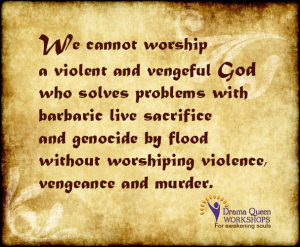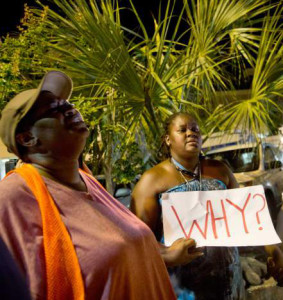The massacre at Emanuel A.M.E. in Charleston could have been our wake-up call. In fact, it should have been. But it appears that, once again, we’ve hit the snooze button.
We’d rather not gaze upon the important insights that this church violence offers us. Instead, we cry, “How did the devil get into God’s House? Why did God let this happen? Why didn’t God protect His people?”
Our questions are based on a few assumptions:
- The church is God’s only house;
- Worshipers should be safe in a church building, and
- God intervenes in human events.
There’s no evidence that any of these assumptions are true; so questions based on them are likely to lead to the wrong answers.
Common sense tells us that a white supremacist would happily open fire on Blacks who were minding their own business and posed no threat to him. Hate-filled karma-creators do these kinds of things.
We don’t expect grand things from small minds—or from souls who believe that they are the human body costumes they’re wearing. As a consequence, there are millions whose karmic bank accounts are significantly overdrawn. Repaying their debts is not an option in a what-goes-around-comes-around world.
The view from the balcony
It’s almost impossible to see the entire plot of any drama by looking at one scene. It’s definitely impossible if we’re standing on the stage. Just as distance and an aerial vantage point help us see the entire forest, a balcony view helps us to see the Big Picture: what caused the problem and what’s lurking in the wings. That informs our assumptions and helps us ask questions that will actually lead to productive answers.
As a general rule, those of us in the balcony watch the drama on stage through this lens:
Our perceptions might be our reality, but no one else’s.
Everything we believe about ourselves and others might not be true.
No one stumbles onto Earth’s stage by accident.
Perspective is important. The sun looks smaller than Earth from where we’re standing. From the perspective of the Bible writers, Earth obviously looked flat. But just because they wrote that it is, doesn’t make it true.
I invite you to experiment by looking at each drama you encounter from a different perspective. For example, we view the church violence drama from a different set of assumptions:
- Every house is God’s house;
- The omnipresent and immortal God is within every soul, not in outer space;
- God is fair, and either intervenes in every drama or none at all.
 Now, based on those assumptions, what questions do we ask? Actually, we ask the same two questions of every scene we’re observing: Why did I (as soul) create this (drama)? How does it serve me (as a divine being)?
Now, based on those assumptions, what questions do we ask? Actually, we ask the same two questions of every scene we’re observing: Why did I (as soul) create this (drama)? How does it serve me (as a divine being)?
I can hear your protests: “I didn’t create the massacre at Mother Emanuel!”
Oh, but if you, as soul, wanted to learn something from it, you absolutely positively did create it. And nine souls stepped out of their human body costumes to teach you.
Every drama on Earth’s stage that meets your awareness, no matter how far it is from your physical location, is designed to teach you a lesson you desired to learn: Perhaps compassion, respect, love, forgiveness.
When we look at these human dramas as personally crafted lessons, we are more likely to learn them and less likely to recreate them. There’s evidence that dramas repeat until we learn the lessons they were designed to teach.
Building on our previous lessons
We’ve been told that animals can smell fear and we’ve been cautioned not to be fearful around them. Why? Because they might attack.
According to some studies, humans also can smell fear. In fact, one study even concludes that fear is contagious:
Its authors wrote, “Our research suggests that emotional chemo-signals can be potential contributors to emotional contagion in situations involving dense crowds.”
This is an interesting finding that causes those of us in the balcony to wonder: If the fire-and-brimstone threats of unending torment are so frightening that millions want to be “saved” from it, what happens when that fear is concentrated within the confined the space of church sanctuaries decade after decade, century after century? Why doesn’t occur to us that the crucifix on our buildings is the murder weapon that killed Jesus?
Fear Attracts Attack
Statistics might also indicate that the human response to fear is similar to animals’, so we should not presume that church buildings are immune from attack. Emanuel A.M.E. wasn’t the first church to be struck by violence, and it wasn’t the last. At least three black churches in the South were torched within a week of Dylann Roof’s massacre in Charleston.
Records show that more than 90 black churches have been the scenes of violence in the past 59 years. A Huffington Post list only reflects the incidents that were recorded during that period. Reportedly, records on church violence were not kept prior to 1956.
The data conflict; but all figures reveal that black churches are not the only targets and the violence is escalating. According to a USA Today report, there were 22 violent deaths at worship centers nationwide in 1999. Another report in the Christian Science Monitor claims 780 deadly attacks in U.S. places of worship between 1999 and 2014. In 2012 alone, the Monitor claims, there were more than 115 incidents; 63 ended in at least one fatality.
Church violence exceeds school violence
Church security consultant Carl Chinn compiles statistics on church violence, and his figures show that there is more violence in churches than in schools. He has found that since 1963, more than 900 violent incidents have occurred in American churches—12 of them, mass murders. A Huffington Post article cites even more: 1,420 church fires in 1980 alone. In fact, a spike in violence against churches in the 1990s led Congress to pass the Church Arson Prevention Act in 1996.
Chinn and others now conduct violence awareness seminars at churches to train ushers and other staff. Unfortunately, these tactics only address the symptoms, not the cause.
The root of the evil
If we’re really honest, we can’t deny that there is a lot of talk in churches about an angry, vitriolic, vengeful and violent God who solves problems by killing humans. Sure, there’s some talk about God’s love, grace and redemption. But it’s incongruent with their overarching message: God responds to wrongdoing with cruel and unusual punishment.
Where did we learn what God did to Adam and Eve, the witless predecessors of cavemen, who didn’t have the intellectual capacity to obey an order? No one thinks that it is humane to banish defenseless beings to the wilderness. But the church must obediently say amen to this heartless behavior.
We gather in confined spaces on a regular basis to hear that humans are lowly and innately evil. That’s why God heinously drowned almost everyone. The church says amen to genocide.
We’re supposed to forgive 70 times 7; but God’s default is inhumane punishment. “Amen!” we shout.
God made a bet with the devil, intentionally causing horrific pain and hardship to a good, obedient man, just to prove his loyalty. “Amen!”
God had our beloved Jesus sadistically tortured to death instead of us, and we scream: “Thank you, God!”
Reaping what we’ve sown
We claim that God is Love. Would Love threaten to torture us throughout all eternity? Do we need to be “saved” Love?
There’s a reason why they scare us with threats of horrific torment: Frightened people typically react instinctively, not thoughtfully. They’ve used fear to trap us in a nightmare.
 We worship a god who uses “His” sovereignty to act like demon. Yet, we are inexplicably stunned when evil boldly enters our churches.
We worship a god who uses “His” sovereignty to act like demon. Yet, we are inexplicably stunned when evil boldly enters our churches.
We invite evil into our pews every time we agree that God is full of wrath, not love. We ushered it in every time we shouted amen to claims that God is vengeful, violent, unforgiving and solves problems by harming, killing and torturing humans.
We have created church violence. The burning buildings and lifeless bodies to teach us that. This is the lesson we, as souls, wanted to learn. But will we? I can’t repeat it enough: We cannot worship a violent, vengeful God who solves problems by killing people without worshiping violence, vengeance and murder.
Will we choose instead to spread a different contagion, fill our churches with the joyful noise that a divine, loving god dwells within everyone and everything? Will we worship an ALL-mighty god, rather than one who gave power to Satan? Will we order the god of evil out of our hearts and out of our houses of worship?
The alarms are sounding. The fires are burning. The bullets are flying. Unfortunately, we are so paralyzed with fear that we can barely reach the snooze button.



